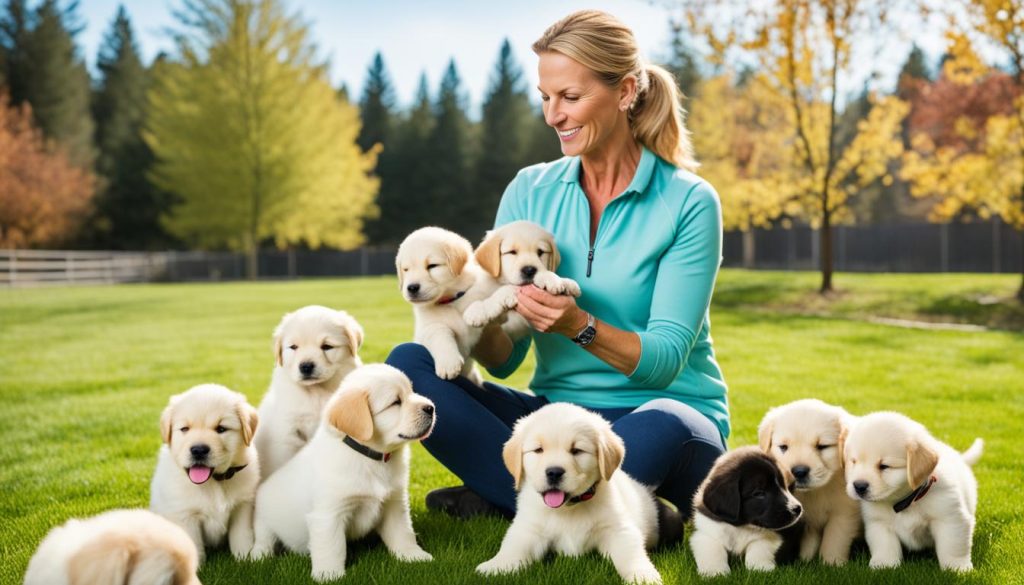Did you know that there are approximately 10,000 commercial dog breeders in the United States alone?
When it comes to finding your perfect four-legged companion, it’s essential to distinguish between the good and the bad. While there are reputable dog breeders who prioritize the well-being of their dogs, there are also those who engage in unethical practices that jeopardize the health and welfare of the animals.
In this article, I will delve into the world of dog breeders, providing you with ethical insights and red flags to watch out for. Whether you’re searching for reputable dog breeders near you or looking to understand the importance of responsible breeding, this guide will equip you with the knowledge to make an informed decision.
Key Takeaways:
- There are approximately 10,000 commercial dog breeders in the United States.
- It’s crucial to differentiate between reputable and unethical dog breeders.
- This article will provide ethical insights and red flags to watch out for.
- Understanding the importance of responsible breeding is key when choosing a dog breeder.
- By making informed decisions, we can ensure the well-being of our furry companions.
The Role of a Responsible Dog Breeder
A responsible dog breeder plays a vital role in ensuring the welfare of dogs and upholding ethical breeding practices. When looking for a reputable breeder, it’s important to be aware of the signs that indicate their commitment to the well-being of their dogs and puppies.
Signs of a Reputable Dog Breeder
A reputable dog breeder demonstrates their dedication to responsible breeding through certain key indicators. These signs include:
- Proper health testing for parent dogs: A responsible breeder prioritizes the health and genetic screening of their breeding dogs to prevent the passing on of hereditary conditions.
- A clean and suitable breeding environment: Reputable breeders maintain clean and comfortable living conditions for their dogs, ensuring proper sanitation and adequate space.
- Commitment to the well-being of the puppies: Ethical breeders prioritize the socialization, nutrition, and overall care of the puppies to ensure they grow up to be healthy and well-adjusted.
Ethical Dog Breeding Guidelines
Responsible dog breeding guidelines revolve around prioritizing the health, temperament, and breed standards of the dogs. These guidelines include:
- Breeding for health: Reputable breeders focus on breeding dogs with sound health, free from hereditary conditions, and aim to improve the overall genetic health of the breed.
- Breeding for temperament: Ethical breeders select parent dogs with stable and desirable temperaments to produce puppies with good behavior and suitable traits for their respective breeds.
- Breeding to preserve breed standards: Responsible breeders strive to maintain and enhance the breed’s characteristics and conformation, adhering to breed standards set by kennel clubs or breed organizations.
By following these ethical guidelines, responsible dog breeders ensure the production of healthy, well-rounded, and true-to-type puppies.
| Signs of a Reputable Dog Breeder | Ethical Dog Breeding Guidelines |
|---|---|
| ✓ Proper health testing for parent dogs | ✓ Breeding for health |
| ✓ A clean and suitable breeding environment | ✓ Breeding for temperament |
| ✓ Commitment to the well-being of the puppies | ✓ Breeding to preserve breed standards |
Finding Reputable Dog Breeders Near You
When it comes to finding a reputable dog breeder, location matters. By looking for breeders near your area, you not only have the opportunity to visit their facilities but also to meet the parent dogs and assess their living conditions. This firsthand experience plays a crucial role in ensuring you choose a responsible breeder committed to the well-being of their dogs and the puppies they produce.
Local breeders provide you with the chance to observe the temperament and behavior of the parent dogs. This interaction allows you to assess their suitability for your lifestyle and preferences. It also gives you peace of mind knowing that the parent dogs are healthy and well-cared for, as this is often indicative of the standard of care given to the puppies.
Additionally, choosing the right dog breeder involves considering their expertise in the specific breed you desire. Reputable breeders specialize in particular breeds and have in-depth knowledge about their characteristics, temperament, and specific care requirements. By choosing a breeder with expertise in your preferred breed, you can benefit from their guidance, advice, and support throughout your dog’s life.
Visiting Local Breeders
Visiting local breeders is an important part of the selection process. During your visit, take note of the cleanliness and overall condition of the breeder’s facilities. A reputable breeder will maintain a clean and sanitary environment for their dogs and puppies, ensuring their well-being and preventing the spread of diseases.
While at the breeder’s facilities, pay close attention to the living conditions of the dogs. They should have adequate space, proper shelter, and access to clean water and nutritious food. A breeder who prioritizes the comfort and care of their dogs demonstrates their commitment to responsible breeding practices.
Furthermore, reputable breeders are transparent about their breeding practices, health testing protocols, and any genetic health issues specific to the breed. They should be open to answering your questions and providing you with documentation and certifications that validate their claims. Their commitment to transparency and honesty shows their focus on breeding healthy and genetically sound puppies.
Choosing a reputable dog breeder is a crucial step in finding your perfect furry companion. By exploring reputable breeders near you, you have the opportunity to witness their breeding practices firsthand, assess the parent dogs’ temperament and welfare, and ensure that you choose a breeder with expertise in your desired breed.
| Benefits of Finding Reputable Dog Breeders Near You |
|---|
| 1. Firsthand experience of the breeder’s facilities |
| 2. Meeting the parent dogs and evaluating their temperament |
| 3. Assurance of the living conditions for the dogs and puppies |
| 4. Access to breeder’s expertise in your desired breed |
| 5. Transparency and validation of health testing protocols |
By considering these factors and putting in the effort to find reputable dog breeders near you, you can make an informed decision, confident that you are choosing a breeder who prioritizes the welfare of their dogs and produces healthy, well-adjusted puppies.
Red Flags in Dog Breeding Practices
In the world of dog breeding, it’s important to be aware of red flags that indicate unethical practices. These red flags can help you identify breeders who may prioritize profit over the well-being of the dogs. By recognizing these warning signs, you can make an informed decision and ensure that your furry companion comes from a reputable source.
Common Red Flags in Dog Breeding
- Breeding for Profit: Some breeders may prioritize financial gain over the welfare of the dogs. They may cut corners on health testing, proper care, and socialization.
- Multiple Litters: Breeders who have multiple litters at the same time may indicate a lack of focus on individual puppy care. This can lead to inadequate attention and socialization for each puppy.
- Inadequate Living Conditions: Dogs should be kept in clean and suitable environments. Red flags can include overcrowded spaces, lack of proper shelter, and unsanitary conditions.
- Lack of Health Testing and Documentation: Responsible breeders prioritize the health of their dogs. Red flags can include a failure to perform necessary health tests on parent dogs and a lack of proper documentation for vaccinations and other medical records.
For a comprehensive understanding of red flags in dog breeding practices, refer to the table below:
| Red Flags in Dog Breeding Practices |
|---|
| Prioritizing profit over the welfare of dogs |
| Breeding multiple litters at the same time |
| Inadequate living conditions for the dogs |
| Lack of proper health testing and documentation |
Questions to Ask Dog Breeders
When it comes to finding the right dog breeder, asking the right questions is vital. These questions will help you gain insights into the breeder’s practices and ensure that they are responsible and reputable. Here are some important questions to ask:
- Do you health test your dogs? It’s crucial to know if the breeder conducts health tests on their dogs to screen for any genetic or hereditary conditions that may be common in the breed.
- How do you socialize the puppies? Proper socialization during the early stages of a puppy’s life is essential for their well-being. Ask the breeder how they ensure the puppies are exposed to different experiences, people, and environments.
- Do you offer ongoing support and advice? A responsible breeder should be available to provide guidance and support even after you bring your puppy home. Ask if they are willing to assist you with any questions or concerns you may have.
- Do you offer a health guarantee? A reputable breeder should offer a health guarantee for their puppies. This ensures that if any health issues arise soon after adoption, the breeder takes responsibility and provides necessary support.
By asking these questions, you can gain a better understanding of the breeder’s commitment to the welfare of their dogs and the quality of their breeding program.
| Breed | Question |
|---|---|
| Labrador Retriever | Do the parent dogs have clearances for hip and elbow dysplasia? |
| Golden Retriever | Have the parent dogs been tested for heart conditions and eye diseases? |
| German Shepherd | Do the parent dogs have a certified working or show title? |
| French Bulldog | Have the parent dogs been cleared for common respiratory and spinal issues? |
Remember, it’s important to tailor your questions to the specific breed you’re interested in. Each breed may have unique health concerns and characteristics that you should inquire about to ensure you make an informed decision.
The Importance of Breed-Specific Education
As a responsible dog owner, understanding the specific needs and characteristics of the breed you’re interested in is crucial. Breed-specific education provides you with valuable insights that enable you to make informed decisions regarding your furry companion’s care and well-being.
By delving into breed-specific education, you gain knowledge about various aspects of your chosen breed, including:
- Temperament: Understanding the breed’s typical temperament helps you gauge compatibility and anticipate behavior patterns, allowing for better training and socialization.
- Exercise Requirements: Different breeds have different exercise needs. Breed-specific education helps you determine the appropriate amount and type of physical activity required to keep your dog happy and healthy.
- Grooming Needs: Some breeds have low-maintenance coats, while others require regular grooming. Breed-specific education guides you in understanding the grooming requirements, including brushing, bathing, and professional care.
- Potential Health Issues: Certain dog breeds are predisposed to specific health conditions. Being aware of these potential issues allows you to take preventive measures, seek appropriate veterinary care, and understand the lifespan and overall health of your dog.
Breed-specific education empowers you to proactively address the specific needs of your chosen breed, ensuring a harmonious and fulfilling relationship with your four-legged friend.
A Table Comparing Exercise Needs of Different Dog Breeds
| Breed | Exercise Level |
|---|---|
| Golden Retriever | High |
| Shih Tzu | Low |
| Husky | Very High |
| Pug | Low |
Understanding the exercise needs of different dog breeds helps you plan appropriate activities and provide adequate mental and physical stimulation for your canine companion.
Ethical Considerations in Puppy Mills
Puppy mills are notorious for their unethical dog breeding practices. These facilities prioritize profit over the well-being of the dogs, often leading to overcrowded and unsanitary conditions. Purchasing a puppy from a puppy mill supports this inhumane industry, so it’s essential to avoid them.
| Unethical Dog Breeding Practices in Puppy Mills |
|---|
| Overcrowded and inhumane living conditions |
| Lack of proper healthcare and socialization |
| Breeding dogs without considering genetic health issues |
Unfortunately, puppy mills continue to operate due to the demand for puppies from unsuspecting buyers. It’s important to educate ourselves and make responsible choices when bringing a new furry friend into our lives.
“Puppy mills are breeding factories that prioritize profit over the welfare of dogs. By purchasing a puppy from these establishments, you are directly supporting unethical dog breeding practices and perpetuating animal suffering.” – The Humane Society of the United States
Instead of supporting puppy mills, consider adopting a rescue dog from a local shelter or reputable rescue organization. Adopting a dog not only gives them a second chance at life but also helps combat the unethical practices of puppy mills.
The Impact of Puppy Mills
The impact of puppy mills goes beyond the mistreatment of dogs. These breeding facilities can contribute to the increased spread of diseases, behavioral issues in puppies, and a lack of genetic diversity within certain breeds. It’s vital to raise awareness about puppy mills and advocate for responsible dog breeding practices.
The Adoption Option
When it comes to welcoming a furry companion into your life, consider adopting a rescue dog instead of purchasing one from a breeder. Not only does dog adoption provide a loving forever home for a deserving animal, but it also plays a vital role in reducing the number of dogs in shelters. Many rescue organizations offer a diverse range of breeds and sizes, ensuring there’s a perfect match for every potential dog owner.
Choosing dog adoption not only benefits the individual dog but also has a positive impact on society as a whole. By adopting a rescue dog, you are helping to alleviate the burden on animal shelters and foster care systems, making space for other dogs in need. It’s a compassionate decision that gives an abandoned or neglected dog a second chance at a happy life.
Adopting a rescue dog is a rewarding experience that comes with numerous advantages. Rescue dogs often bring unconditional love, loyalty, and gratitude into their new homes. They have the potential to become the most cherished family members, providing endless companionship and joy.
Moreover, rescue dogs are typically already spayed or neutered, saving you the expense and responsibility of arranging this vital procedure. They may also have received some basic training and socialization during their time in a shelter or with a foster family, making the transition into your home smoother and more enjoyable.
If you’ve made the decision to adopt a rescue dog, take the time to research and visit local animal shelters or rescue organizations. Speak with their staff to learn more about the adoption process, get advice on choosing the right dog for your lifestyle, and gather all the necessary information about the dog’s health, temperament, and history.
Remember, dog adoption is a lifelong commitment. Ensure you are prepared to provide a loving and caring environment for your new furry friend, meeting their physical, mental, and emotional needs. The rewards of adopting a rescue dog are immeasurable, and you will forever be grateful for the bond you create with your four-legged companion.
Responsible Dog Ownership
Being a responsible dog owner goes beyond choosing the right breeder. It involves providing proper care, training, socialization, and veterinary care throughout the dog’s life. Owning a dog is a long-term commitment, and responsible owners prioritize their furry companions’ well-being.
Proper care includes fulfilling the dog’s basic needs such as a balanced diet, clean water, regular exercise, and a safe living environment. Regular visits to the veterinarian for vaccinations, check-ups, and preventive care are essential for maintaining the dog’s health and well-being.
Training is an important aspect of responsible dog ownership. It not only establishes boundaries and discipline but also helps dogs become well-behaved members of the family and society. Training should focus on positive reinforcement techniques and should be consistent and ongoing throughout the dog’s life.
Socialization plays a crucial role in a dog’s behavior and temperament. Introducing the dog to various people, animals, and environments from a young age helps prevent fear and aggression. Proper socialization contributes to a well-adjusted and happy dog.
Veterinary Care Checklist
| Aspect of Veterinary Care | Responsibilities |
|---|---|
| Vaccinations | Ensure the dog is up-to-date on all necessary vaccinations as recommended by the veterinarian. |
| Annual Check-ups | Schedule regular annual check-ups to monitor the dog’s overall health and address any potential concerns. |
| Preventive Medications | Administer preventive medications for fleas, ticks, heartworm, and other common parasites as directed by the veterinarian. |
| Dental Care | Practice good dental hygiene by regularly brushing the dog’s teeth and providing chew toys or dental treats. |
| Spay/Neuter | Consider spaying or neutering the dog to prevent unwanted pregnancies and reduce the risk of certain health issues. |
Responsible dog ownership also includes providing mental stimulation and appropriate outlets for the dog’s energy. This can be achieved through interactive toys, puzzle games, and regular exercise routines. Engaging with the dog on a daily basis strengthens the bond between owner and pet.
“A responsible dog owner understands that their dog is a lifelong companion and treats them with love, care, and respect.”
Lastly, responsible dog owners understand the importance of legal and ethical responsibilities. They comply with local laws regarding licensing, leash regulations, and picking up after their dogs in public spaces. They also ensure their dog does not infringe upon the rights and well-being of others.
By embracing responsible dog ownership, individuals can provide their furry friends with a happy, healthy, and fulfilling life.
The Benefits of Dog Ownership
Owning a dog offers a multitude of benefits that can improve our lives in various ways. From providing companionship to enhancing our physical and mental well-being, dogs truly hold a special place in our hearts.
Companionship and Emotional Support
Dogs are loyal and loving creatures, always ready to offer unconditional companionship. They provide a sense of belonging and form deep emotional bonds with their owners. Whether you’re feeling joyful or facing a difficult moment, having a dog by your side can bring comfort and a feeling of emotional support.
Increased Physical Activity
Having a dog encourages regular physical exercise. Dogs need daily walks and playtime, which motivates owners to stay active. Engaging in activities such as walking, jogging, or playing fetch not only benefits the dog’s health but also helps improve cardiovascular fitness and weight management for the owner.
Reduced Stress Levels
Interacting with dogs has been shown to reduce stress levels and promote relaxation. Petting a dog releases oxytocin, a hormone associated with stress reduction and increased feelings of happiness. Simply spending time with a dog can help alleviate anxiety and bring a sense of calmness to our lives.
Improved Mental and Emotional Well-being
Dog ownership has been linked to improved mental well-being. Dogs provide companionship, which can alleviate feelings of loneliness and depression. Having a dog can also boost self-esteem and help individuals develop a sense of purpose and responsibility.
Therapy and Assistance Dogs
Dogs can serve as therapy animals, offering emotional support to individuals in need. Therapy dogs visit hospitals, nursing homes, and schools, providing comfort and joy to those they encounter. Additionally, highly trained assistance dogs, such as guide dogs for the visually impaired, provide invaluable assistance and improve the quality of life for individuals with disabilities.
As we can see, the benefits of owning a dog extend far beyond companionship. From increased physical activity and reduced stress levels to improved mental and emotional well-being, dogs have the power to enhance our lives in countless ways. Whether as a loving pet or a dedicated service animal, the positive impact of dogs on individuals and society as a whole is undeniable.
A furry friend brings joy, love, and a sense of fulfillment, making dog ownership a truly rewarding experience.
Responsible Breeding as a Solution
Encouraging responsible dog breeding is essential in addressing unethical practices within the industry. By promoting education and ethical guidelines, as well as advocating for legislation that protects the welfare of dogs, we can work towards creating a positive change and improving the standards of dog breeding.
Breeders who prioritize responsible breeding practices play a vital role in ensuring the health and well-being of their dogs. They take into account factors such as genetic health testing, proper socialization of puppies, and adherence to breed standards. These breeders are committed to producing healthy, well-adjusted puppies and are transparent about their practices.
Responsible breeding also involves finding suitable homes for the puppies and offering ongoing support and guidance to new dog owners. Breeders who genuinely care about the welfare of their dogs remain accessible and are willing to address any concerns or questions that arise after adoption.
Moreover, responsible breeding contributes to preserving and improving the characteristics and qualities of different dog breeds. Breeders who prioritize ethical practices work towards producing dogs that not only embody breed standards but also possess sound temperaments and good health.
“Responsible breeding ensures that every puppy has the best start in life, with proper care, socialization, and a solid foundation for a healthy future.” – [Breeder Name]
Responsible breeding practices also extend beyond the breeders themselves. It is important for prospective dog owners to educate themselves about responsible breeding and support breeders who prioritize the welfare of their dogs. By choosing to purchase a puppy from a responsible breeder, dog owners contribute to a healthier and more ethical dog breeding industry.

Through collective efforts, including education, awareness, and legislation, we can foster a culture of responsible dog breeding. This will not only ensure the well-being of dogs but also establish a standard that promotes ethical breeding practices across the industry.
Conclusion
In conclusion, when searching for a furry companion, it is crucial to understand the difference between good and bad dog breeders. Responsible breeders prioritize the welfare of their dogs and adhere to ethical breeding practices that promote the well-being of the animals. By choosing reputable breeders and supporting responsible dog ownership, we can ensure that our canine friends receive the love, care, and respect they deserve.
Good dog breeders follow guidelines that focus on health, temperament, and breed standards, ensuring that the puppies they produce are healthy and of good quality. They conduct proper health testing for parent dogs, maintain clean and suitable breeding environments, and provide ongoing support and advice to the new owners.
On the other hand, bad dog breeders engage in unethical practices that prioritize profit over the welfare of the dogs. They may breed multiple litters simultaneously, have inadequate living conditions for the animals, and lack proper health testing and documentation. It is important to be aware of these red flags and avoid supporting breeders who operate irresponsibly.
By staying informed and making educated choices, we can contribute to the betterment of the dog breeding industry. Responsible breeders play a vital role in ensuring the health and happiness of dogs, and by supporting them, we help create a culture of ethical breeding and responsible dog ownership. Let us continue to advocate for the well-being of our furry friends and make the world a better place for them.



